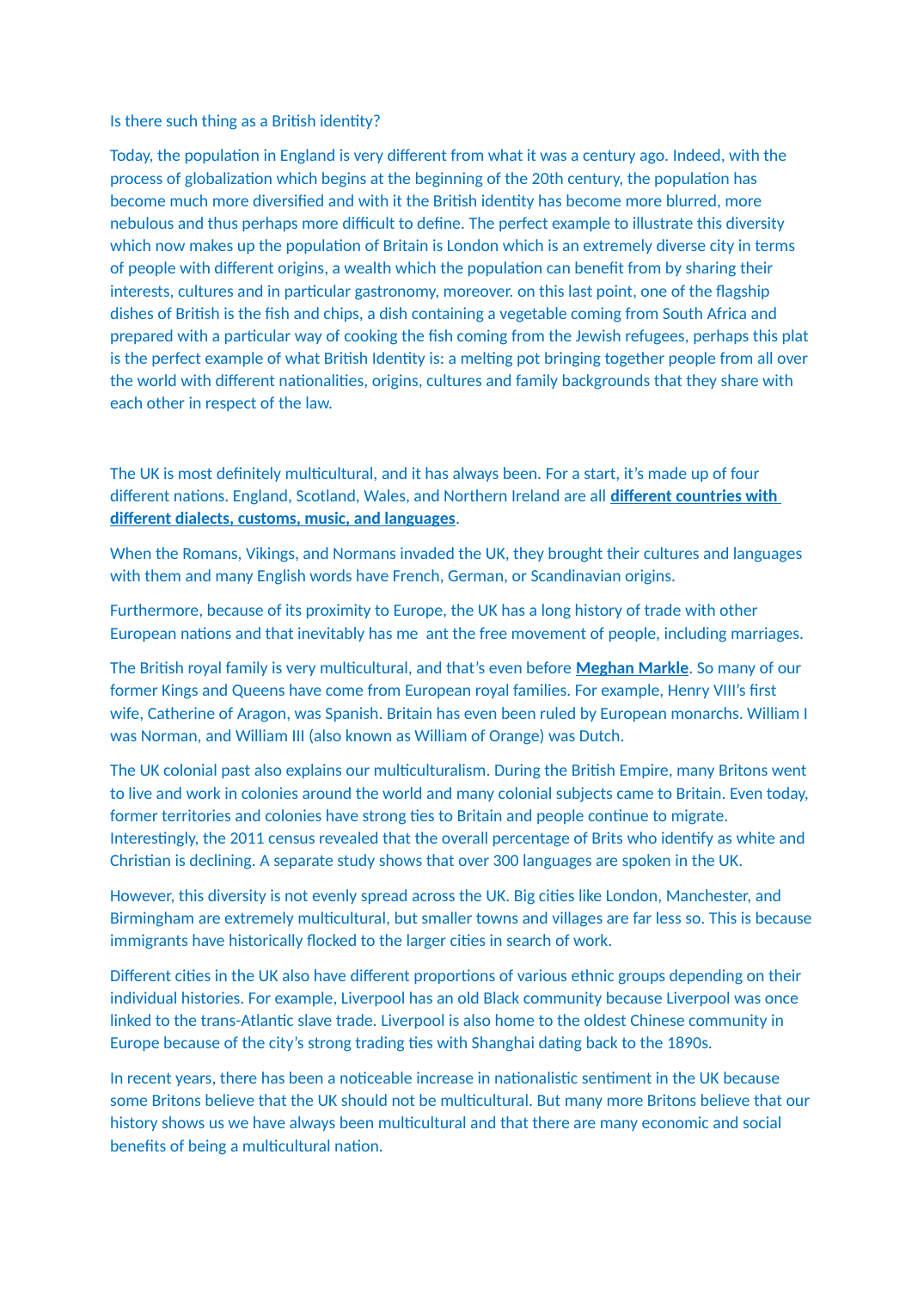Is there such thing as a British identity ?
Publié le 21/11/2021

Extrait du document
«
Is there such thing as a British identity?
Today, the population in England is very different from what it was a century ago.
Indeed, with the
process of globalization which begins at the beginning of the 20th century, the population has
become much more diversified and with it the British identity has become more blurred, more
nebulous and thus perhaps more difficult to define.
The perfect example to illustrate this diversity
which now makes up the population of Britain is London which is an extremely diverse city in terms
of people with different origins, a wealth which the population can benefit from by sharing their
interests, cultures and in particular gastronomy, moreover.
on this last point, one of the flagship
dishes of British is the fish and chips, a dish containing a vegetable coming from South Africa and
prepared with a particular way of cooking the fish coming from the Jewish refugees, perhaps this plat
is the perfect example of what British Identity is: a melting pot bringing together people from all over
the world with different nationalities, origins, cultures and family backgrounds that they share with
each other in respect of the law.
The UK is most definitely multicultural, and it has always been.
For a start, it’s made up of four
different nations.
England, Scotland, Wales, and Northern Ireland are all different countries with
different dialects, customs, music, and languages .
When the Romans, Vikings, and Normans invaded the UK, they brought their cultures and languages
with them and many English words have French, German, or Scandinavian origins.
Furthermore, because of its proximity to Europe, the UK has a long history of trade with other
European nations and that inevitably has me ant the free movement of people, including marriages.
The British royal family is very multicultural, and that’s even before Meghan Markle .
So many of our
former Kings and Queens have come from European royal families.
For example, Henry VIII’s first
wife, Catherine of Aragon, was Spanish.
Britain has even been ruled by European monarchs.
William I
was Norman, and William III (also known as William of Orange) was Dutch.
The UK colonial past also explains our multiculturalism.
During the British Empire, many Britons went
to live and work in colonies around the world and many colonial subjects came to Britain.
Even today,
former territories and colonies have strong ties to Britain and people continue to migrate.
Interestingly, the 2011 census revealed that the overall percentage of Brits who identify as white and
Christian is declining.
A separate study shows that over 300 languages are spoken in the UK.
However, this diversity is not evenly spread across the UK.
Big cities like London, Manchester, and
Birmingham are extremely multicultural, but smaller towns and villages are far less so.
This is because
immigrants have historically flocked to the larger cities in search of work.
Different cities in the UK also have different proportions of various ethnic groups depending on their
individual histories.
For example, Liverpool has an old Black community because Liverpool was once
linked to the trans-Atlantic slave trade.
Liverpool is also home to the oldest Chinese community in
Europe because of the city’s strong trading ties with Shanghai dating back to the 1890s.
In recent years, there has been a noticeable increase in nationalistic sentiment in the UK because
some Britons believe that the UK should not be multicultural.
But many more Britons believe that our
history shows us we have always been multicultural and that there are many economic and social
benefits of being a multicultural nation..
»
↓↓↓ APERÇU DU DOCUMENT ↓↓↓
Liens utiles
- How Is Britain Dealing With Its Identity Crisis ?
- analyse picturale "British ‘Chute Jumpers" (1937) par un photographe inconnu
- Error: There's a form with more q than Q, trying to fix Définition: ADDITIVITÉ, substantif féminin.
- Error: There's a form with more q than Q, trying to fix ADDITIVEMENT, adverbe.
- Error: There's a form with more q than Q, trying to fix ACERBITÉ, substantif féminin.


